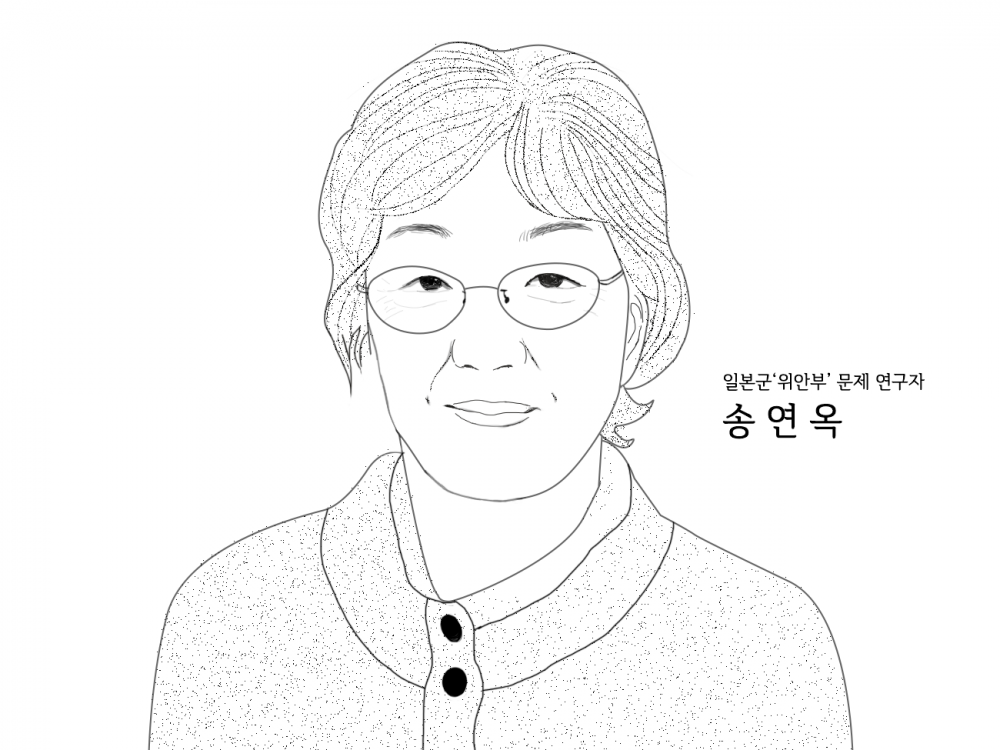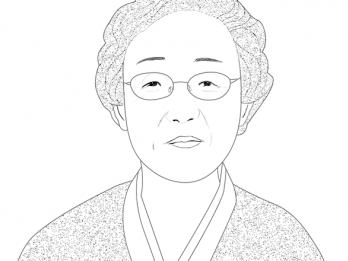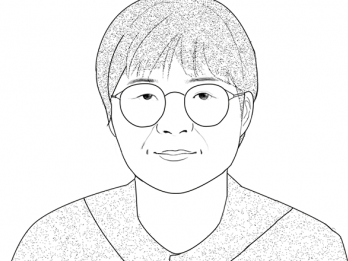
Song Yeon-ok (Director of the Cultural Center Arirang; Emeritus Professor of Aoyama Gakuin University)
She is an Emeritus Professor of Aoyama Gakuin University. As a Korean in Japan (a Zainichi Korean) and a researcher who laid the foundation for the studies of colonial history and women's history in Japan, she has been playing an important role in investigating the truth about the ‘Comfort Women’ issue. Her main publications include 『Military and Sexual Violence』, 『A Study on the East Asia Japanese military sexual slavery (co-authorship)』, 『A Study of 70 Years of Women's History in Korea (co-authorship)』, 『Colonialism, War, ‘Comfort Women’ for the Military (co-authorship)』, 『War and Social Affairs in East Asia(co-authorship)』, and so on.
Q. Please give us a brief introduction about yourself for the webzine [Kyeol] readers who may not be familiar with your name.
I am a second-generation Korean in Japan, born in 1947 in Osaka, Japan. Although my nationality is Korean, I received education from Japanese educational institutions exclusively. Thus, Japanese, the language of the Empire, would be the mother tongue that I can use to best express myself. I am a person whose daily life somatizes colonialism. When I graduated from college, I saw that Koreans in Japan were socially excluded due to ethnic discrimination. In order to learn about the historical background to this, I went to South Korea hoping to study national history. However, the political season of my country felt like winter at the time. I returned to Japan without completing my master's degree in Seoul. It was in 1992 when I once again returned to South Korea. Although at one point I wanted to give up studying history, I was hired at the age of 50 as a professor at Aoyama Gakuin University in Tokyo, and this enabled me to do my research properly afterwards.
Q. How did you first get to know about the ‘Comfort Women’ issue?
I got to know about the issue by reading 『Military Comfort Women (従軍慰安婦)』 (双葉社、1973) by Senda Kakou (千田夏光) a few years after graduating from college. Although I was shocked by reading Senda's book, I found its feministic perspective to be weak. Therefore, I developed a vague hope that I would be helpful in easing the resentment of the ‘Comfort Women’ victims one day. However, I had never imagined at the time that the victims would still be alive in South Korea, as I had supposed most of them would have been killed or abandoned on the battlefield.
Q. Please tell us about the research on the ‘Comfort Women’ that you have been conducting so far.
I read an article titled '5,000 prostitutes to be liberated' written by Choi Jeong-seok, which was published in 『New Dawn』 No. 77 (February-March issue of 1948). This article changed my perception of the Japanese colonial period. At the beginning of the article, there was a phrase that read, 'There are two kinds of damages on women left by the Japanese in this land: one is the state-regulated prostitution system (公娼制度) and the other is the maintenance and extension of their feudalistic culture of female slavery.' Choi Jeong-seok certainly knew about ‘Comfort Women’, but he also argued that the state-regulated prostitution system including the ‘Comfort Women’ system was the most direct (端的) demonstration (実証) among the ugliest (醜悪) of all, of the exploitation (搾取) of Japanese imperialism (日帝) and the social evil (社会悪) of this land.'
Although it is widely believed that the ‘Comfort Women’ system had begun in 1932, it actually occurred long before the Japanese Empire had started to abuse and exploit the sexual bodies of Korean women and traffic impoverished women. After viewing the process of the Japanese invasion following the Korean-Japan Treaty of 1876, and after reading Choi Jeong-seok's article, I thought I should study the state-regulated prostitution system, which the Japanese Empire took advantage of for its colonial rule. I discovered through my studies that the state-regulated prostitution system that applied to colonial Korea shared the same name as the state-regulated prostitution system in Japan, but its contents were more favorable to business owners and unfavorable to women compared to the state-regulated prostitution system in Japan. I have been studying how this state-regulated prostitution system under colonial rule had become the premise for the ‘Comfort Women’ system.
Q. As a Korean in Japan, it must not have been that easy to study on ‘Comfort Women’.
It is said in Japan that it can be difficult even for a Japanese person to be hired as a university professor if the ‘Comfort Women’ issue is set as a research project. In other words, that person gets branded as someone with anti-Japanese ideals. I once made a presentation titled 'The Japanese Colonial Rule and the National Management of Prostitution' at the Joseon History Research Association conference in 1993. The results of the research suggested that the rate of prostitution among Koreans increased during the Sino-Japanese War, which was consistent with the argument that Korean people became embroiled in the war system. However, a South Korean male international student who heard my presentation voiced harsh criticisms against me. Even though I knew he simply misunderstood my intention, I also felt skeptical towards such a form of nationalism. Considering the fact that Koreans in Japan had no choice but to engage in 3D work amid ethnic discrimination after liberation, it is hard to understand that kind of reaction.
Q. Is there any especially memorable ‘Comfort Women’ victim you met during your research?
In late August 1992, just before the establishment of the diplomatic relations between South Korea and China, I went to the Mudan River in China and met Kim Sun-ok (1922-2018). I accidentally learned of Kim Sun-ok's life. Once, a group of civic groups interested in the ‘Comfort Women’ issue went as far as Dongning (東寧) close to the Russian border for an investigation. They were guided by a former Japanese soldier. On the last day of their investigation, an old person from the village told them that a woman named 'Kaiko' was a 'comfort woman' in the past. However, the group simply returned home with their questions unanswered at the time, as the group could not postpone their return date due to the difficulty of arranging a trip to China at that time.
Afterwards, Kim Young-hee and I went to Dongning for an investigation with the help of Professor Lim Hee-joon of Yanbian University. It was not easy to even get to Dongning from Yanji (吉林). We travelled by a taxi for 10 hours and managed to arrive there in the evening. However, Kim Sun-ok was not at home as she reportedly had gone to her daughter's house in Mudan River. We had no choice but to stay overnight in Dongning that day, and left for Mudan River early the next morning. I realized how vast China was. As the roads were not paved, I was quickly overcome with exhaustion just by moving long distances. That probably explains why I was so deeply touched beyond words when I finally met Kim Sun-ok. She seemed truly delighted, as we were the first compatriots that had visited her from outside, and she treated us like relatives she had not seen in a long time. I still vividly remember how Kim Sun-ok told us her stories as if all at once, she was pouring out all the painful and bitter experiences that she had never revealed before even to her own daughter. Meeting her also solved the mystery of 'Kaiko'. 'Kaiko' meant Kayoko, a Japanese name for the comfort stations, and that is what those in the village used to call Kim Sun-ok. I just feel perplexed as I imagine how she must have felt whenever people in the neighborhood called her 'Kaiko'.
Q. I wonder if the ‘Comfort Women’ issue seen from the perspective of Koreans in Japan might be slightly different from the perspective of South Korean researchers living in a divided country.
The differentiating factor for Koreans in Japan who learned exclusively from Japanese educational institutions is that they display dispassionate eyes when evaluating Japan. The same goes for the Japanese historical studies community which since early on, has been pointing out the problem. Japan pays great attention to the 15 years of war that took place from 1931 to 1945, but this is not the case when it comes to its colonial rule. It is in this context that I argued that the war actually lasted for 50 years, not 15 years. Although there is little we can do about the reality that Korea is divided, the way people look at North Korea remains unstable, to range from underestimation to overestimation, and I feel the same incongruity in the ‘Comfort Women’ research.
Q. Among the many issues surrounding the ‘Comfort Women’, which part did you intend to pay attention to or focus on?
The results I concluded from my research on the comfort stations in Shanghai was that in areas such as Shanghai where it used to be battlefields and then turned into occupied territories, various prostitution businesses expanded and prospered around the comfort stations. We need to shed more light on the social aspects of war, in which prostitution 'restaurants' complement the comfort stations and prosper together with other prostitution businesses by obtaining their justifications owing to other state-run comfort stations. I think that the debate over whether it is licensed prostitution or not arise from the lack of understanding about the actual conditions according to the time and region. Also, the definition of the state-regulated prostitution system in Japan is based on the regulations of civil law, peacetime, and the abolition of licensed prostitution. However, during the Japanese colonial era did Korea experience peacetime, which can thus employ civil law? I think that such a definition of the state-regulated prostitution system would lack consideration of the knowledge on colonialism and the history of the war society.
Q. As a researcher, or as an individual, what does the ‘Comfort Women’ research mean to you? What is the driving force behind your constant research on the ‘Comfort Women’?
While living as a female Korean in Japan, I have experienced the combination of sexism, ethnic discrimination, and class discrimination. I have also suffered deep psychological wounds. I think the ‘Comfort Women’ issue symbolizes this complex discrimination. Colonialism, which is the root of the problem, is also consistent with the hate speech that recently appeared in Japanese society. As the problem has not been resolved yet and still distresses us on a daily basis, I feel compelled to conduct research in the hope of creating a healthy society.
Q. I think the ‘Comfort Women’ issue is one of the most sensitive and front-line problems (in South Korea) among all various academic and social issues. In what direction should the younger scholars expand their research on the ‘Comfort Women’ issue in the future? What would you like to tell the younger scholars who are currently studying in this area?
Despite many testimonies, research, and efforts in investigating the truth, some aspects of the ‘Comfort Women’ issue seem to be still trapped in outdated discourse and frameworks. For example, while many people are reluctant to acknowledge the connection between the state-regulated prostitution system and the ‘Comfort Women’ system, not many can properly understand or explain the state-regulated prostitution system. We need many new studies that focus on the state-regulated prostitution system and the ‘Comfort Women’ system to reveal the specific and actual circumstances according to the time and place.
Q. The ‘Comfort Women’ issue is a universal issue recognized by most South Korean people. However, if we look at this a little more closely, one may observe that the public's perception of the ‘Comfort Women’ remains only on an emotional level. I would like to ask you what you think is the cause of this phenomenon.
In my opinion, the ‘Comfort Women’ issue is associated with strong ethnic perspectives but remains weak when it comes to a viewpoint that compounds feministic and hierarchical perspectives. It is also strongly associated with nationalism created after liberation for national unity. Much progress has been made in the historical studies community to go beyond the stage of evoking two antagonistic notions of pro-Japanese versus anti-Japanese, but this achievement does not seem to be well-reflected in the public's views towards the ‘Comfort Women’ issue. Therefore, I think that social history research on the Japanese colonial period should increase its diversity, and the reality of compatriots who had lived at home and abroad under Japan's war of aggression should be revealed more thoroughly. Also, both South Korean and Japanese societies still have high levels of curiosity, contempt, and hatred towards prostitution. Such repulsions arises any time the state-regulated prostitution system is mentioned. Therefore, we need to build a society in which feministic values are more common and sexual rights are respected.
Q. Please advise us on what direction the Research Institute on Japanese Military Sexual Slavery should move to, given the situation mentioned above.
As a history major, I would like to advise you that the ‘Comfort Women’ issue should be regarded as a problem that happened due to colonialism and the war of aggression, and is a problem that persists to this day. Also, more studies should dig into the background of the birth of the ‘Comfort Women’ system. In other words, future research should concretely examine the social and economic situations of each region in Korea under colonial rule. If one focuses on the ‘Comfort Women’ issue exclusively, one may also possibly rather disregard empirical research due to the influence of political discourse. The ‘Comfort Women’ issue should be regarded as a structural and overlapping problem. In addition, I hope that you continue to discover and collect the materials already present in China, and widely publicize the achievements in order to first nurture the young researchers.
Related contents
-

- Remembering the First Steps: Meeting with First-Generation Researchers – (1) Yoon Jung-ok
-
She has long been interested in the ‘Comfort Women’ issue and has been striving to unveil the truth about the issue while serving as a professor in English literature at Ewha Womans University. From 1980, she has been searching for and meeting with the ‘Comfort Women’ victims in order to investigate the truth.
-

- Meeting the first-generation researcher, to remember the first step - (3) Kang Jeong-sook
-
Kang Jeong-sook majored in the women's history of modern Korea, and currently works as a researcher at the Centre for East Asian History at Sungkyunkwan University. She contributed greatly to the early studies on the ‘Comfort Women’, by investigating the truth of the ‘Comfort Women’ issue, recording the testimonies of the ‘Comfort Women’ victims, etc. while working at the Korean Institute of Japanese Military Sexual Slavery and the Truth Commission on Forced Mobilization.
-
Writer
Editorial Team of Webzine
-
Editorial Team of Webzine <Kyeol>